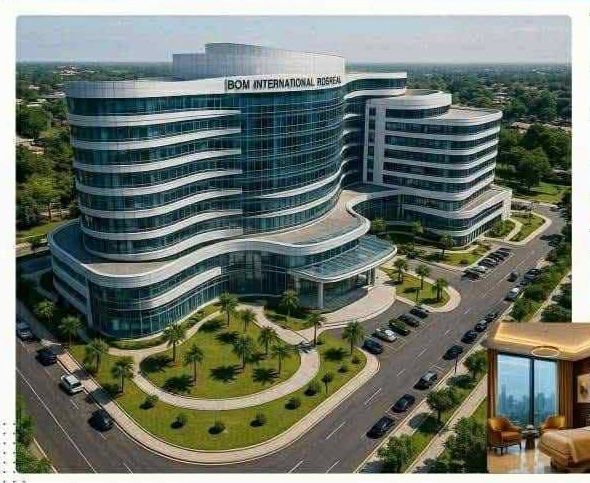At the just-concluded public presentation of the Socio-Economic Impact of the ARISE Agenda in Two Years, themed “Measuring Progress, Deepening Impact”, held at the Banquet Hall of Government House, Uyo, among the presentations made was the unveiling of a bold economic outlook detailing Governor Umo Eno’s relentless commitment to transformative investments.
One of the audacious landmark projects highlighted by the Managing Director and Chief Executive Officer of Akwa Ibom Investment Corporation, Pastor Imo-Abasi Jacob, was the proposed 350-bed Ibom International Hospital, a flagship healthcare infrastructure designed to position Akwa Ibom as a regional hub for medical excellence and in-bound medical tourism, while advancing the ARISE Agenda’s vision of inclusive growth and sustainable development.
Many have asked the difference between the existing Ibom Multi-Specialty Hospital and the proposed Ibom International Hospital, with some outrightly dismissing the idea as unnecessary, presenting an opportunity to correct misconceptions and highlight the compelling vision behind this forward-thinking healthcare investment by Governor Umo Eno’s administration.
Far from being a misplaced priority as perceived by naysayers, this ambitious project reflects a strategic response to meeting the long-standing gaps in the state’s healthcare system and an intentional bid to reverse outbound medical tourism.
While both institutions share the overarching goal of enhancing healthcare delivery and improving patient outcomes, they differ significantly in their overall design, operational capacity, service scope, and underlying purpose.
Firstly, the Ibom Multi-Specialty Hospital, established during the administration of Senator Godswill Akpabio, is a secondary and tertiary referral center, equipped to provide general and specialist care to residents of the state and beyond. However, due to years of inconsistent management and a retinue of issues, the facility has struggled to achieve its intended potential.
Secondly, the proposed Ibom International Hospital is envisioned as a state-of-the-art, 350-bed medical and research complex designed to anchor Akwa Ibom as a regional hub for medical tourism. It will feature cutting-edge diagnostics, specialist surgeries, advanced cancer treatment, critical care units, medical research and training programs, attracting not only top local professionals but also Nigerians and foreigners who travel abroad for medical care, affirming a visionary leap into global-standard healthcare.
While revamping existing structures is prudent and indeed, Governor Umo Eno has already unveiled plans to revitalize the Ibom Multi-Specialty Hospital and hand it over to a private firm for better management, there is a limit to how much retrofitting the facility can achieve without slowing the need for space, modular architecture backed with smart technologies, and future scalability.
Building the Ibom International Hospital from scratch enables the government to integrate global best practices in hospital design, sustainability, and management, something that patchwork renovations cannot deliver. More importantly, it doesn’t replace the existing facility but complements it as part of a broader, tiered health delivery system to earn Joint Commission International (JCI) accreditation, which will signify Akwa Ibom’s commitment to meeting internationally recognized standards for quality and patient safety.
So what about the poor? Is this not an elitist project? While this concern is understandable, it misses the broader vision because this administration has been intentional in institutionalizing a governance model that serves all Akwa Ibomites irrespective of social status.
If the Governor has been frugal with the resources of the state, prudently cutting waste, renegotiating contracts to save billions, and redirecting funds to priority sectors – why would he suddenly embark on a vanity project? Would a leader who has consistently demonstrated fiscal discipline now choose to squander scarce resources?
On the contrary, this project is a calculated investment made possible by careful financial stewardship, ensuring that while essential social programs and grassroots projects continue to receive funding, the state also positions itself for long-term healthcare advancement and economic growth.
Long before the idea of Ibom International Hospital was conceived, Governor Umo Eno prioritized strengthening the Primary Healthcare system across all 31 LGAs, with the construction of ARISE Model Primary Health Centres. Sixteen of such facilities are now operating with solar power, clean water, medical staff, and essential drugs.
Moreover, this administration’s commitment to inclusive healthcare is further demonstrated by the launch of the mandatory health insurance scheme in September 2024, designed to provide affordable and accessible coverage for all residents of the state at just ₦18,000 per year. Already, over 105,000 residents have been enrolled, with expansion underway to cover civil servants and their dependents.
This bold step has not only reduced the financial burden of healthcare on households but also earned Akwa Ibom national recognition, receiving the “Fastest Growing Agency in Healthcare Coverage” award from the Institute of Health Insurance and Managed Care in April 2025 for its remarkable progress in extending health insurance coverage.
Additionally, the state-of-the-art Emergency Medical Service and Ambulance System (AKISEMSAS) was launched to improve emergency healthcare response, including an Emergency Control Centre designed to enhance emergency services – all targeted at improving access to medical care for vulnerable and low-income earners. Are these cutting-edge measures serving only the elites? The answer is no.
It is therefore imperative to emphasize that the proposed Ibom International Hospital is not an exclusive preserve of the wealthy. Through the state’s mandatory health insurance scheme, there will be subsidized treatment windows for indigent patients referred from Primary and Secondary Healthcare Centres, ensuring that the most vulnerable members of society can also access world-class medical care. This approach blends excellence with equity, guaranteeing that cutting-edge healthcare services are available to all, not just to those with deep pockets.
There are also plans for specialized outreach programs including cancer screening, paediatric care, and maternal health clinics for underserved rural communities. The facility will generate revenue from international patients and health tourists, which will cross-subsidize free and low-cost care for Akwa Ibomites.
Furthermore, with advanced training programs embedded in the hospital’s operational model, Akwa Ibom health professionals will have direct access to world-class skills development without leaving the state. This capacity-building will not only raise the standard of care within the Ibom International Hospital but also create a ripple effect across the entire medical ecosystem, as better-trained personnel return to strengthen Primary and Secondary Healthcare Centres statewide.
Yearly, thousands of Nigerians spend over $1 billion seeking medical care abroad – funds that could instead stimulate our local economy. By establishing the Ibom International Hospital, a significant share of that expenditure can now remain within Akwa Ibom, driving job creation, spurring the growth of the hospitality and service sectors, and opening new avenues for medical tourism. The facility’s strategic location also positions it to serve not just Akwa Ibom residents, but patients from across the Niger Delta, as well as West and Central Africa.
Beyond the economic benefits, the hospital is designed to attract global partnerships, hosting advanced research, and setting new standards for medical innovation and training in the region. This will inspire public confidence in our healthcare system, reduce the need for outbound medical travel, and contribute to reversing the “medical brain drain” by providing local professionals with opportunities for career advancement and exposure to world-class practices right here at home.
With the construction of the 350-bed Ibom International Hospital underway, Governor Umo Eno’s vision is clear: ensure accessible, affordable healthcare, while positioning Akwa Ibom as a global player in tertiary and specialized medical services.
AmanamHillary Umo-Udofia, PhD
Special Assistant on Media to the Akwa Ibom State Governor.




